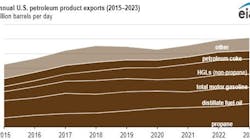Shirish Nadkarni
OGJ Correspondent
MUMBAI, Mar. 17 -- India's largest refiner, Indian Oil Corp. (IOC), is ready to spend $3 billion for an overseas oil production firm, preferably in Africa or the Confederation of Independent States (CIS).
Such an acquisition would give state-run IOC a guaranteed and uninterrupted supply of crude for its refineries so as to meet rising demand for petroleum products in India, the world's second-fastest growing major economy behind China.
"Our target is a company that owns fields in Africa or in countries that were part of the former Soviet Union," said B.M. Bansal, IOC director for business development. "It is possible that the acquisition will be made jointly with Oil India Ltd."
India's two largest companies in the energy sector—Oil & Natural Gas Corp. (ONGC) in the exploration and production arena, and IOC at the refining end—have been scouting for projects in Russia, Kazakhstan, Iran, and Africa to meet fuel demand in a race with China, which is securing energy supplies to meet its own needs.
India has been beaten by China to more than $10 billion of overseas energy assets over the last 2 years. It is now adopting "a smarter strategy" to accumulate oil assets; Like China, it is offering to build ports and railways in Africa to secure equity in oil and gas fields.
Production from India's ageing domestic fields has been slumping in recent years, and the country is becoming heavily dependent on imports, to the extent of 70% of its total annual requirements.
The nation needs to find new sources of fuel as its government seeks to pump up economic growth from 9%/year to double digits to increase jobs and eradicate poverty in a country where, according to the World Bank, half of the 1.1 billion people live on less than $2/day.
IOC has asked the government's help in its hunt for new oil-producing areas. "We would like to tap some new areas that are coming up on the world oil map, rather than trying to get into already established markets," said Bansal. "We already own blocks in countries like Libya, Yemen, and Nigeria where finds have yet to be made, but we are aiming at a more diversified portfolio. We are working both at our level and at a government-to-government level."
The company is keen to acquire exploration rights overseas in existing fields that need to be developed. To secure oil field equity in oil-producing African nations, it will offer to build refineries and pipelines in return. It has already made such offers to Nigeria, Libya, and Turkey. Entry into Turkey occurred 3 months ago when India's energy markets regulator approved a planning application by IOC and Calik Holding for a refinery for which a feasibility study is being conducted.
Analysts say acquiring a company abroad would add value to IOC. Rohit Ahuja at the Mumbai-based JM Financial ASK Securities, said, "They are in need of oil, and getting it from their own source would mean getting it cheaper. That will help in improving their refining margins."
However, some say the $3 billion IOC has earmarked for an overseas acquisition is far too small to make any serious difference in crude imports. Oil-related equity is not cheap, even in seriously underdeveloped African countries where investing in such stakes is even more hit-and-miss than in more established areas.
One problem with raising more funds is the government's diktat to keep petroleum product prices artificially low in what is beginning to look increasingly like a year in which a mid-term election could be held.
IOC also is saddled with expansion and modernization of existing refineries and the need to improve the quality of petrol and diesel production. Petrol quality upgrades have already been initiated at all IOC refineries and are expected to be commissioned by December 2009. The investment is pegged at $2.25 billion, putting further strain on the company's resources.
Having recorded reasonably good refining margins through the first three quarters of fiscal 2007-08, IOC is expecting a major drop in the fourth quarter due to the sudden jump in crude prices and the weakening of the rupee against the US dollar. Weakness in refining margins has caused a severe cash crunch and strained the company's liquidity position.
